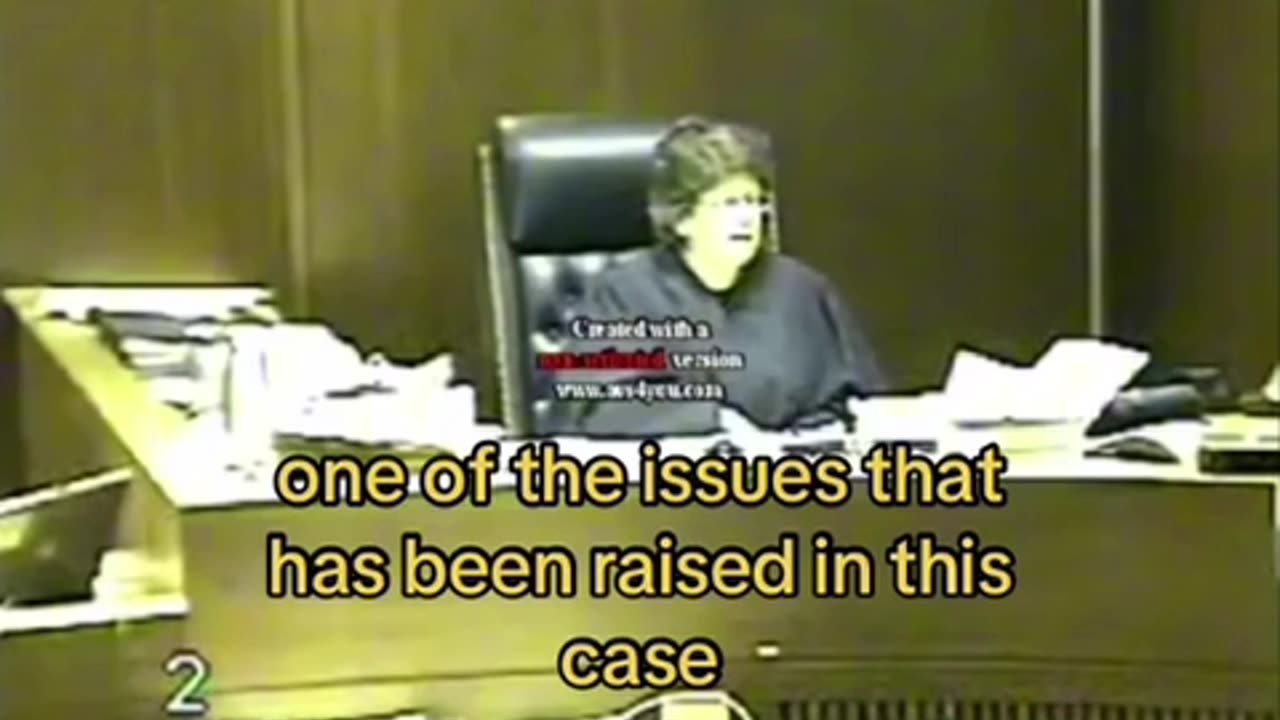Premium Only Content

The Illusion of Authority: Sovereignty, Jurisdiction, and the Power Play in Modern Courtrooms
In the intricate maze of legal systems, power, and control, the concept of jurisdiction reigns supreme. It is the cornerstone that legitimizes a court’s authority over a case and its participants. However, the rise of sovereign movements and alternative legal theories have begun to dismantle this conventional understanding. They question the very essence of governmental authority and push the boundaries of legal frameworks to their breaking point. This article delves deep into the paradoxical tension between individual sovereignty and state authority, pulling back the curtain on jurisdictional power plays, and providing an exhaustive exploration of the legal, philosophical, and esoteric underpinnings of this debate.
I. The Underlying Power of Jurisdiction: A Deceptively Simple Concept
Jurisdiction is more than a mere technicality; it’s the bedrock of legal authority. Without it, the court’s decisions hold no weight, as exemplified by cases like United States v. Lopez, which demonstrated the critical limits of federal power. Jurisdiction functions as the defining force of governance, drawing the line between who controls what and where. But what happens when that line is blurred, questioned, or outright rejected?
Sovereign citizens argue that jurisdiction over their personhood—referred to as the “natural man”—does not lie with the state but with the individual. This belief upends the traditional view of the law and brings into sharp focus the philosophical question: Where does true authority lie?
II. The Natural Person vs. The Legal Entity: Two Worlds in Conflict
Central to the argument is the distinction between the natural person and the legal entity—a bifurcation first popularized by the sovereign citizen movement. The argument states that an individual’s birth certificate and Social Security number create a legal fiction that represents them in the eyes of the government. By extension, the person in court is not the actual living human being, but a corporate entity, separate from the natural person, and thus under a different set of laws.
At the heart of this theory is the Uniform Commercial Code (UCC), a body of law governing commercial transactions. Sovereigns claim that they have been unwittingly entered into contracts with the state upon birth and that these contracts, rooted in commerce rather than law, can be rejected.
The consequences of this belief are vast. By rejecting the legal fiction, they reject the state’s power. The judicial system, in this context, is not merely a tool of justice but a commercial court enforcing civil obligations on an unwilling party.
III. Traffic Violations and Debt Collection: Unveiling the True Nature of Enforcement
The sovereign citizen position regarding traffic violations turns mainstream legal interpretations on their head. In their view, traffic tickets are not criminal offenses but are, in fact, civil debts governed by commercial law. According to their interpretation of 15 U.S.C. § 1692, the Fair Debt Collection Practices Act applies to the enforcement of traffic fines. This suggests that police officers act as debt collectors when issuing tickets, representing a direct financial relationship between the individual and the state, rather than the criminal or civil enforcement of public safety laws.
To the sovereign citizen, traffic violations are less about safety and more about revenue generation. This interpretation is bolstered by research into municipalities that rely heavily on fines as a source of revenue, thus further legitimizing their belief that the court system acts more like a debt collection agency than an institution of justice.
IV. The Significance of Symbols: Flags, Admiralty Law, and the Courts
The sovereign citizen movement is replete with references to the symbolic power wielded in the courtroom. For example, the gold-fringed flag seen in many courtrooms is not just ceremonial, they argue, but indicative of Admiralty Law—a system of law traditionally reserved for the high seas and commerce. In their view, this signals that courts are not acting under common law, but under a military or corporate jurisdiction designed to adjudicate commercial contracts, not civil or criminal cases.
This belief is not entirely unfounded in legal history. Admiralty Law has evolved over centuries to regulate commercial activity, and many elements of this ancient system continue to exist today. Sovereign citizens extend this historical precedent into their interpretation of the court’s role in modern society, viewing it as an extension of corporate governance over individuals.
V. Legal Precedents and the Challenge to Jurisdiction
Cases like Boswell v. Owens and West v. Los Angeles Municipal Court have introduced critical questions about the nature of jurisdiction, especially when the court’s authority is questioned. These cases underscore that courts do not automatically have jurisdiction simply because they assert it; the mere presence of a defendant does not grant a court authority over their person. When jurisdiction is not properly established, the resulting legal rulings can be nullified.
This concept is a powerful tool in the sovereign citizen’s arsenal. It questions the assumption that the state inherently has power over individuals, proposing that authority must be consented to and jurisdiction explicitly proven, not merely assumed. The application of these ideas calls into question the very legitimacy of many legal proceedings.
VI. Sovereignty: The Future of the Movement and the Rejection of Authority
At its core, the sovereign citizen movement challenges the modern state’s monopoly on power. With growing distrust in institutions, governments, and legal systems, the appeal of these ideas is gaining traction. What happens if larger segments of the population reject governmental authority? Can a legal system function when its legitimacy is questioned by the very people it is meant to govern?
The deeper implications of this movement signal not just a legal rebellion but a philosophical revolution in the way we view governance, consent, and personal sovereignty. As this movement grows, it challenges us to reconsider the meaning of authority and the nature of personal freedom in a world governed by increasingly complex systems of control.
VII. The Paradox of Power: Individual Sovereignty vs. State Authority
The tug-of-war between the individual and the state has always been fraught with tension. Yet, in today’s era of mass surveillance, growing centralization, and hyper-regulation, this tension has become more palpable. Sovereign citizens argue that individual sovereignty is sacrosanct and that the state’s power over them is illegitimate. The state, on the other hand, claims that it is the authority that grants freedom, ensuring order and safety in society.
This paradox is at the heart of the modern legal system. Can a government claim to protect freedom while simultaneously enforcing laws that infringe upon personal sovereignty? As sovereign movements continue to evolve, this fundamental question will likely become more pressing in years to come.
Conclusion: The Fragility of Modern Legal Authority
The issue of jurisdiction may seem esoteric, but it is one of the most critical underpinnings of legal systems around the world. Sovereign movements challenge this authority, not merely on legal grounds but on philosophical and existential ones. By questioning the legitimacy of the state’s control over the individual, these movements force us to reconsider the balance between personal sovereignty and the need for collective governance.
In an era of increasing centralization of power, surveillance, and state control, the question of jurisdiction and sovereignty is not just an abstract legal debate—it is a defining issue for the future of governance and personal freedom.
This reimagined exploration pushes the boundaries of our understanding of sovereignty, legal authority, and the very nature of freedom. Through meticulously detailed arguments and a deep dive into the intricacies of jurisdictional law, this article offers a thought-provoking and compelling analysis of a complex and increasingly relevant topic.
-
 1:46
1:46
FragmentsOfTruth
1 day agoThe Power of Truth and Consensus: A Battle for the Collective Mind
821 -

STARM1X16
3 hours agoMerry Christmas Fortnite
9.95K1 -
 2:45:33
2:45:33
Sgtfinesse
3 hours agoMerry Christmas Night
9.04K5 -
 LIVE
LIVE
tacetmort3m
20 hours ago🔴 LIVE - (MERRY CHRISTMAS) TIME TO SPREAD DEMOCRACY - HELLDIVERS 2 OMENS OF TYRANNY
48 watching -
 12:42
12:42
Cooking with Gruel
18 hours agoBrown Butter Trifle with Salted Caramel and Cinnamon Apple
7591 -
 2:46
2:46
BIG NEM
7 hours agoDiscovering RAKIJA: The Holy Liquer of the Balkans
4.03K2 -
 1:11:38
1:11:38
Film Threat
12 hours agoCHRISTMAS DAY CHILL STREAM WITH CHRIS GORE | Hollywood on the Rocks
123K24 -
 14:22:40
14:22:40
The Quartering
1 day agoYule Log Christmas MAGA Edition With Memes! Come Hang Out!
218K29 -
 38:41
38:41
MYLUNCHBREAK CHANNEL PAGE
1 day agoTimeline Begins in 1800? - Pt 1 & 2
98.7K49 -
 1:23:41
1:23:41
Game On!
1 day ago $2.30 earnedNetflix NFL Christmas Games Preview and Predictions!
84.9K13